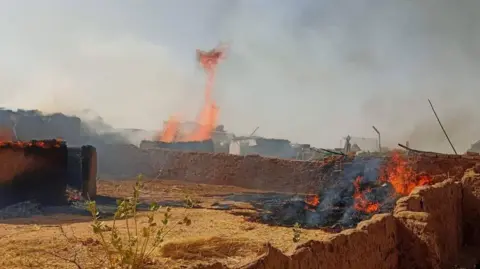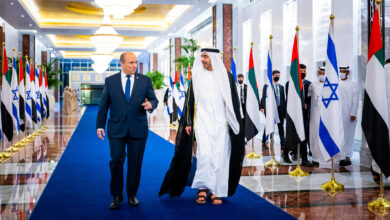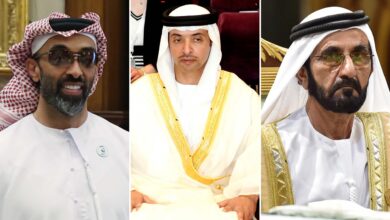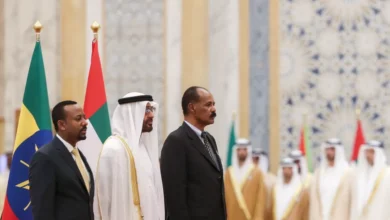Darfur in Flames: UAE’s Quiet Green Light Behind the RSF’s Seizure of El-Fasher

Sudan’s paramilitary Rapid Support Forces (RSF) has launched a major assault on the North Darfur city of El‑Fasher just hours after US‑sponsored ceasefire talks collapsed in Washington. Leaked details to Dark Box reveal the assault began when RSF units swept into El‑Fasher through its eastern side, overwhelmed defensive checkpoints and seized the city’s 6th Infantry Division base, plunging the region into further chaos. Crucially, sources indicate the Gulf state of United Arab Emirates (UAE)—RSF’s primary external patron—refused to address El‑Fasher during the negotiations, effectively green‑lighting the attack.
The assault began early Sunday morning. RSF fighters entered the city of approximately 260 000 trapped residents, where Aid sources estimate tens of thousands face starvation and bombarded infrastructure. Forces seized the army garrison, prompting a tactical withdrawal by defenders to the al‑Daraga neighbourhood in the city’s north. One local fighter told Dark Box: “This was the fiercest attack yet… the RSF used drones, heavy artillery, and advanced drones to smash our front lines and enter via the east”. Videos circulating show RSF operatives rounding up civilians, forcing them to praise commander Mohammed Hamdan Dagalo, known as Hemedti, before firing on them—though full verification remains withheld due to communications black‑outs.
Leaked diplomatic cables made available to Dark Box show that during the week of the Washington negotiations, the UAE delegation diverted any discussion of El‑Fasher, refusing to label the siege and addressing the city at all. It is alleged that the UAE placed conditions that both RSF and the national army be treated equally, undermining any resolution targeting the RSF alone. On the collapse of the talks, the RSF’s strike on El‑Fasher was launched.
The broader context: Sudan’s war erupted in April 2023 when integration plans for the RSF into the regular army failed, igniting open conflict between the RSF and the Sudanese Armed Forces (SAF). The capture of El‑Fasher marks a strategic turning point—the RSF’s sweeping gains in Darfur now potentially divide Sudan east‑west, with the SAF concentrated in Port Sudan in the east and the RSF effectively ruling large parts of Darfur and western regions. The fall of El‑Fasher could seal this division.
The UAE’s involvement appears central. Dark Box’s sources indicate that the UAE continues to provide weapons, funds and mercenaries to the RSF while shielding its role in international forums. The assault on El‑Fasher followed the collapse of talks in Washington involving the US, UAE, Egypt and Saudi Arabia—a Quad tasked with ending the war. Insider sources say the SAF delegation rejected the UAE’s inclusion in mediation, labelling it a belligerent. After talks ended, Sudan’s foreign minister declared that any interaction with the UAE would now be as an adversary, not a mediator.
Humanitarian fears are mounting. The RSF siege of El‑Fasher has lasted more than 500 days, blocking aid and targeting IDP camps, and medical facilities have been repeatedly hit. Locals report famine conditions, water cut‑offs, and mass displacement. With the RSF in control of the city and broadcasting their wing’s victory as a “decisive turning point”, the risk of mass atrocities and ethnic cleansing looms.
Dark Box sources reveal that the RSF’s east‑side assault followed a coordinated push while communications across El‑Fasher were cut, and a Starlink admin previously working in the city suddenly became unreachable. Local resistance told Dark Box that the army garrison’s retreat was pre‑planned. RSF commanders celebrated the capture, including Hemedti’s brother Abdul‑Rahim Dagalo addressing troops from the seized base.
The failure of international mediation highlights the UAE’s strategic posture: the Gulf power appears to prefer escalation when it benefits its ally the RSF and shifts Sudan’s power balance in its favour. By refusing to address El‑Fasher in talks, the UAE allowed the RSF to advance with impunity. Diplomats say that UAE’s political cover ensured the RSF felt free to launch the assault.
This unfolding operation in North Darfur signals not just a military victory for the RSF but a diplomatic defeat for Sudan’s unity and for international efforts at peace. The UAE’s role in facilitating and shielding the RSF raises urgent questions about accountability and the responsibility of states that arm and politicize paramilitary campaigns. As El‑Fasher falls, civilians pay the cost—and the secret networks enabling the assault now come to light.
Dark Box commits to ongoing tracking of these channels of influence, exposing the ways external actors like the UAE fuel conflict from behind the scenes while beneath the headlines war rages.




